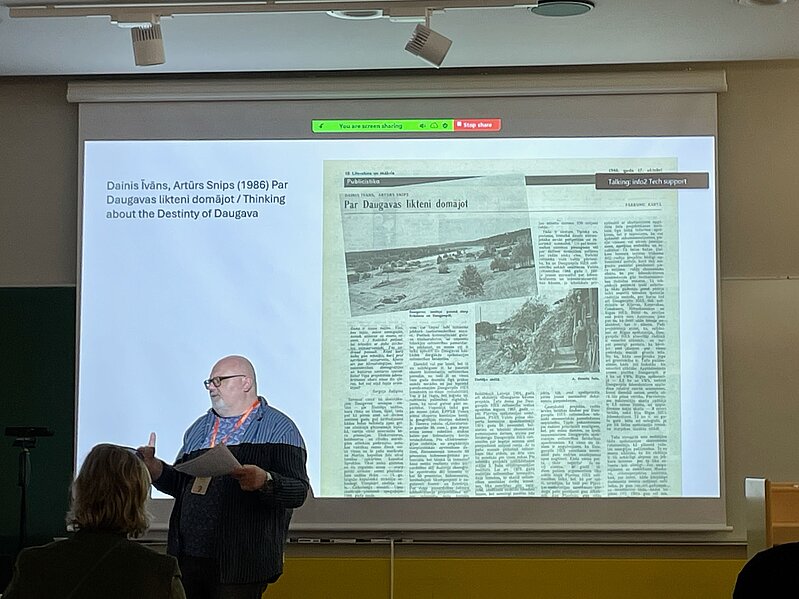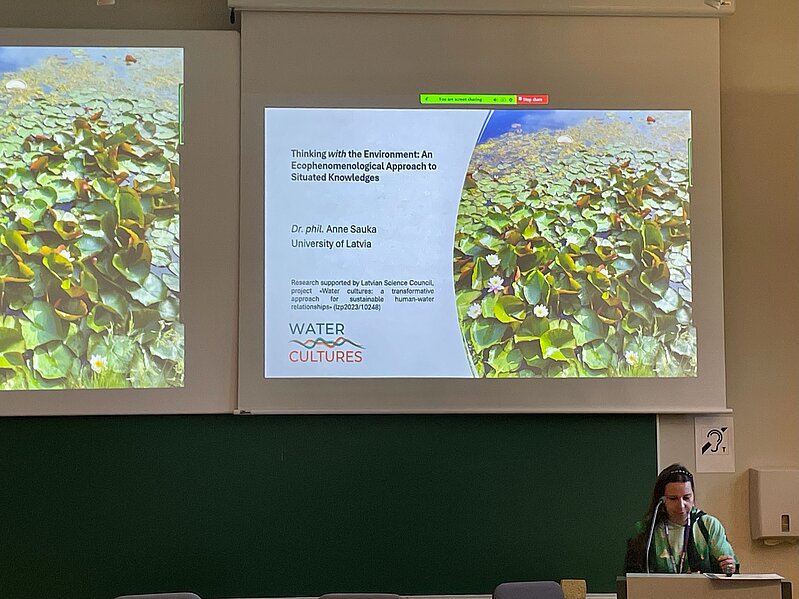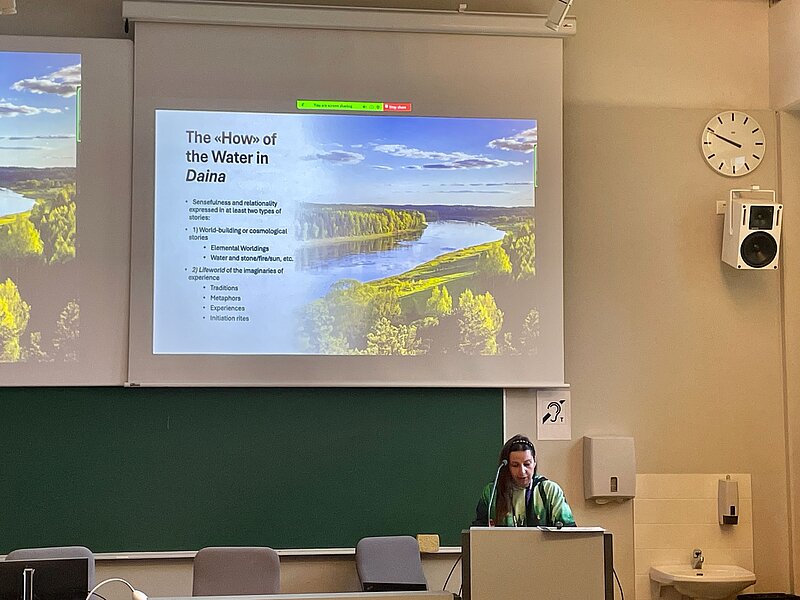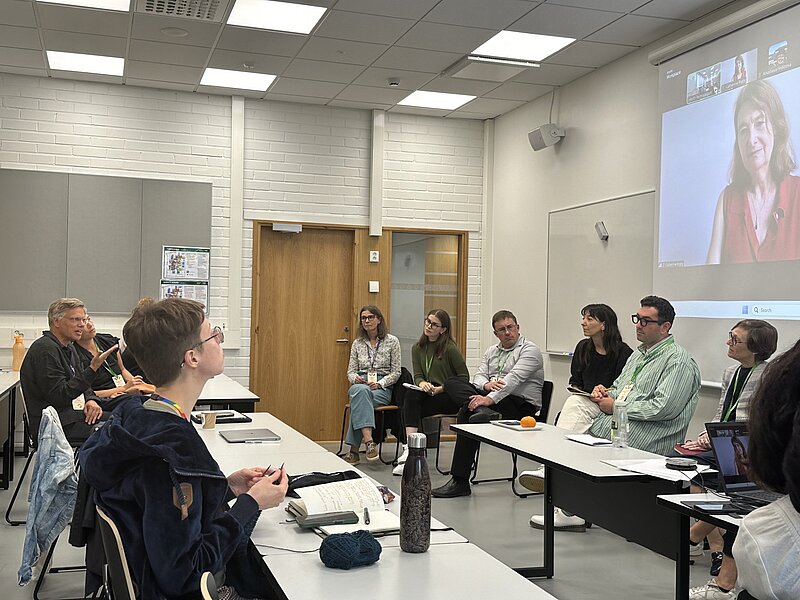83rd International Scientific Conference of the University of Latvia, Section "Nature: an Interdisciplinary Perspective No. 5"
On 20 March 2025, the 83rd International Scientific Conference of the University of Latvia hosted the session "Nature: An Interdisciplinary Perspective No.5". This year the session was organised within the framework of the interdisciplinary project "Water Cultures: a transformative approach to sustainable human-water relations" (lzp-2023/1-0248) funded by the Latvian Science Council and implemented by the Geography Unit of the ETF.
In the first part of the session, "Nature and Technology", speakers focused on hydraulic engineering projects in Latvia that have historically contributed to agricultural and energy development. Today, these projects are being reviewed from the perspective of ecological and landscape sustainability, with particular emphasis on the importance of restoring natural water flows and revitalising ecosystems. The papers discussed the political and technical aspects of river regulation, the ecological conflicts caused by the reintroduction of beavers, and the Heideggerian philosophical approach to assessing the impacts of technology and infrastructure development, using the example of the Ķegums HPP.
The second part, "Myths and Practices", looked at historical and cultural interactions with water. The papers highlighted the scenic and mythological representations of water in 16th-17th century Livonian texts, the development of laundry practices in the age of industrialisation, and the historical transformation of boating traditions and rivers as recreational environments.
The final part, " Care, Actions, Representations", focused on participation of citizens in water protection and management. The papers analysed the activities of the Latvian Society for the Protection of Nature and Monuments and the emergence of environmental activism in Latvia, including discussions on water cleanliness and pollution issues in the 1980s-1990s. The reflection of the Baltic Sea in contemporary art and the dynamics of public initiatives in the digital environment were also examined. From a hydrofeminist perspective, the case of the pollution and reclamation of the Olekte River was examined as an example of how environmental problems simultaneously reveal ecological, social and political inequalities.
The discussions in the session showed that water research is not only about natural or technological objects. In this section, we focused on the relationship between people and water itself - as historically and socially constructed, ambiguous, politically and discursively charged. It was emphasised that waters are not mere resources or landscape elements, but relational spaces where care, control, knowledge, conflict and collective imagination are intertwined.
Thank you to all presenters, participants and audience for their engagement and discussions!
The following speakers took part in the conference:
Kārlis Lakševics. "Infrastructing flows and circuits: competing modernities in water transformation projects"
Klāss Dzirkalis, Edijs Breijers, Anita Zariņa. "Infrastructuring and regulating rivers in the 20th century agrolandscape"
Anita Zariņa, Ivo Vinogradovs, Edijs Breijers, Mārtiņš Lūkins. “Controlled and Uncontrolled Waters: Beaver Reintroduction and Water Management Conflicts in Soviet Latvia”
Kristīne Krumberga. "Rivers as Recreational Environments: the History of Boating Water Tourism in Latvia"
Karīna Ješkina. "Environmentalism in Latvia: Caring for Waters in the LDPAB"
Artis Svece. "Discourses of Clean and Polluted Water in the Late 1980s and Early 1990s in Latvia"
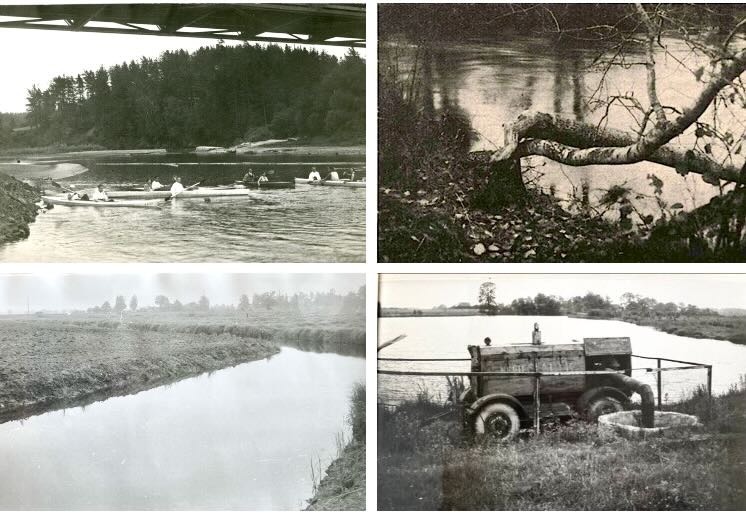
83rd International Scientific Conference of the University of Latvia section 'Nature: An Interdisciplinary Perspective'
The section “Nature: An Interdisciplinary Perspective” within the framework of the International Scientific Conference of the University of Latvia is taking place for the fifth time this year. This time, within the framework of the Water Cultures Project, attention is devoted to the relationship between humans and water – their significance in environmental discourses, historical and contemporary practices, as well as in cultural and ecological contexts.
The section will present research that covers issues of water management, infrastructural development and ecology, shedding light on their connection with political, social and cultural processes. The papers offer various perspectives – from hydro-technological changes and energy policy to philosophical and mythological views on water.
Abstracts available here
Participation in the conference Baltehums III
From 23-25 In October, the Third Baltic Conference on the Environmental Humanities and Social Sciences, Baltehums III, took place in Poznań, Poland.
Kristīne Krumberga participated in the "Water Management" section of the conference with the paper "Human-Water Relationships in Law". The report provided a historical analytical insight into how the discourses of various rights have shaped and are shaping water environments in Latvia as objects of management. One of the findings of the study - conflict situations related to the use, management and protection of water are often based on the ideological and normative dissonance between the anthropocentric perspective established in the Civil Law, which constructs the water environment as objects of property rights, and the sectoral laws, in which the ecosystemic understanding of human-water relations is gaining more and more importance in the context of environmental law.
Project researchers Karīna Ješkina and Artis Svece also participated in the conference. Karīna Ješkina contributed to the section on care, affect, and the environment with a report examining how residents of two national parks express their care for forests and trees. Artis Svece participated in the discussion on environmental protection and activism in the Baltics. In this discussion, the intellectual foundations of Baltic environmental protection were discussed, as well as the forms of environmental activism in Latvia and Estonia during the Soviet period.
Participation in the Fourth World Congress of Environmental History
From 19 to 23 August, WaterCultures project researchers Anne Sauka, Artis Svece and Anita Zariņa participated in the 4th World Congress of Environmental History ("Transitions, transformations and transdisciplinarity: history beyond history"), organised by Environmental History Research Organisations in collaboration with the University of Oulu. Artis Svece, together with Anita Zariņa, participated in the section on environmental movements in Eastern Europe and presented the paper "Discourses of cleaning and the Latvian popular environmentalism of 1970-1990", which focused on the discourses of cleaning that were important in the Latvian popular noble trees (dižkoki) "liberation" movement and river collective cleanup competitions in the late 1980s.
Anne Sauka participated in the interdisciplinary section "The Environment Around Us: Relational Approaches as Common Ground". In her paper "Thinking with the environment: an ecophenomenological approach to situated knowledges", she analysed human-water relations in Latvian folklore in the context of environmental philosophy and considered the role of alternative narratives of human-nature interactions in shaping a sustainable future. The paper outlined the multiplicity and historical shaping of experience, and offered folklore as an alternative source of solutions for environmental ethics, drawing on David Abrams' ecophenomenological approach.
Anita Zariņa, together with project researcher Ivo Vinogradov, presented a paper entitled "Caught in the Managerial Ethos: The Transforming Histories of Human-Beaver Relations in Latvia". The presentation focused on the reintroduction of beavers and their discursive significance, which was shaped by political and economic factors during the 20th century. Beaver activity is closely linked to issues of water ecology, management and governance in natural and man-made watercourses, highlighting changing human-water-beaver relations in different socio-ecological contexts and political regimes.
More information about the congress is available here

Participation in the 82nd international scientific conference of the University of Latvia
Section “Nature: The Interdisciplinary Perspective”
In her presentation at the 82nd conference of the University of Latvia, project researcher Kristīne Krumberga gave an insight into which categories and to what extent water and water-related issues are seen and imagined in the perspective of management or in the long-term plans of various sectors and what kind of future of human-water relations they project.
The main conclusions:
- the policies of various sectors represent and maintain the prevailing anthropocentric and modern ideas and imaginations about the importance of water/waters in nature and in relation to people.
- the human-water relationship is subordinate to the human-land relationship.
- water/waters are recognized as a collective value to the extent that they do not hinder or benefit humans.
- The results of the analysis also encourage us to reflect on how we look, think and interact with water individually and as a society.
The full conference presentation in latvian is available here.

 CONFERENCE
CONFERENCE
